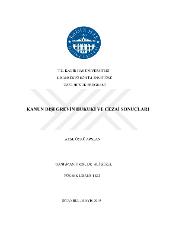| dc.contributor.advisor | Güzel, Ali | en_US |
| dc.contributor.author | Arslan, Ayşe Öykü | |
| dc.date.accessioned | 2020-01-16T07:42:24Z | |
| dc.date.available | 2020-01-16T07:42:24Z | |
| dc.date.issued | 2019 | |
| dc.identifier.uri | https://hdl.handle.net/20.500.12469/2699 | |
| dc.description.abstract | Çalışanların, ekonomik ve sosyal menfaatlerinin korunmasını sağlayan grev hakkı, temel hak ve özgürlüklerden biridir. Uluslararası sözleşmeler ile denetim organlarının içtihadı, grev hakkının kapsamı, korunması ve sınırlanması açısından rehber niteliğindedir. Türk Hukukunda, Anayasa ile korunan grev hakkı sadece işçiler tarafından ve toplu iş sözleşmesi görüşmeleri sırasında uyuşmazlığın ortaya çıkması halinde kullanılabilir. 6356 sayılı STİSK'da, kanuni grevin tanımı ile kanuni grevin şartları düzenlenmiştir. Söz konusu şartlara uygun olmayan grev, kanun dışı grev olarak kabul edilmektedir. Kanun dışı grevin ise hukuki ve cezai sonuçları bulunmaktadır. Tezimizin ilk bölümünde grev, kanuni grev ve toplu eylem kavramları öncelikle uluslararası sözleşmeler ve AİHM, ILO ve Avrupa Sosyal Haklar Komitesi'nin kararları kapsamında incelenecektir. Ardından, bu kavramlara ilişkin Türk hukukunda yer alan düzenlemeler değerlendirilecektir. İkinci bölümde ise, kanun dışı grev hakkında 6356 sayılı Kanun'da yer alan idari para cezaları ile TCK'da yer alan yaptırımlar incelenecektir. | en_US |
| dc.description.abstract | The right to strike, which ensures the protection of economic and social interests of employees, is one of the fundamental rights and freedoms. International conventions and precedents of the national/international supervisory bodies are the guideline for the scope, protection and restrictions of the right to strike. Turkish law dictates that the right to strike, which is protected by the Constitution, may only be enjoyed in the event of a dispute that arises from collective bargaining negotiations. STISK (Law no 6356), regulates the definition and conditions of legal strike. Any strike that does not comply with these conditions, is considered as an illegal strike; and illegal strike has civil and criminal consequences. In the first chapter of the thesis, the concepts of strike, legal strike and collective action will be analyzed, primarily within the scope of international conventions and decisions of the ECHR, ILO and the European Comitee of Social Rights. Then, the regulations in Turkish law, regarding these concepts will be evaluated. In the second chapter, the administrative fines regulated in the Law number 6356 and the sanctions regulated in Turkish Criminal Code, regarding illegal strike, will be analyzed. | en_US |
| dc.language.iso | tur | en_US |
| dc.publisher | Kadir Has Üniversitesi | en_US |
| dc.rights | info:eu-repo/semantics/openAccess | en_US |
| dc.subject | Grev | en_US |
| dc.subject | Kanuni Grev | en_US |
| dc.subject | Kanun Dışı Grev | en_US |
| dc.subject | Kanun Dışı Grevin Sonuçları | en_US |
| dc.subject | Strike | en_US |
| dc.subject | Legal Strike | en_US |
| dc.subject | Illegal Strike | en_US |
| dc.subject | Consequences of Illegal Strike | en_US |
| dc.title | Kanun dışı grevin hukuki ve cezai sonuçları | en_US |
| dc.title.alternative | The consequences of illegal strike in the context of civil and criminal liability | en_US |
| dc.type | masterThesis | en_US |
| dc.department | Enstitüler, Lisansüstü Eğitim Enstitüsü, Özel Hukuk Ana Bilim Dalı | en_US |
| dc.relation.publicationcategory | Tez | en_US |
| dc.identifier.yoktezid | 560459 | en_US |
















